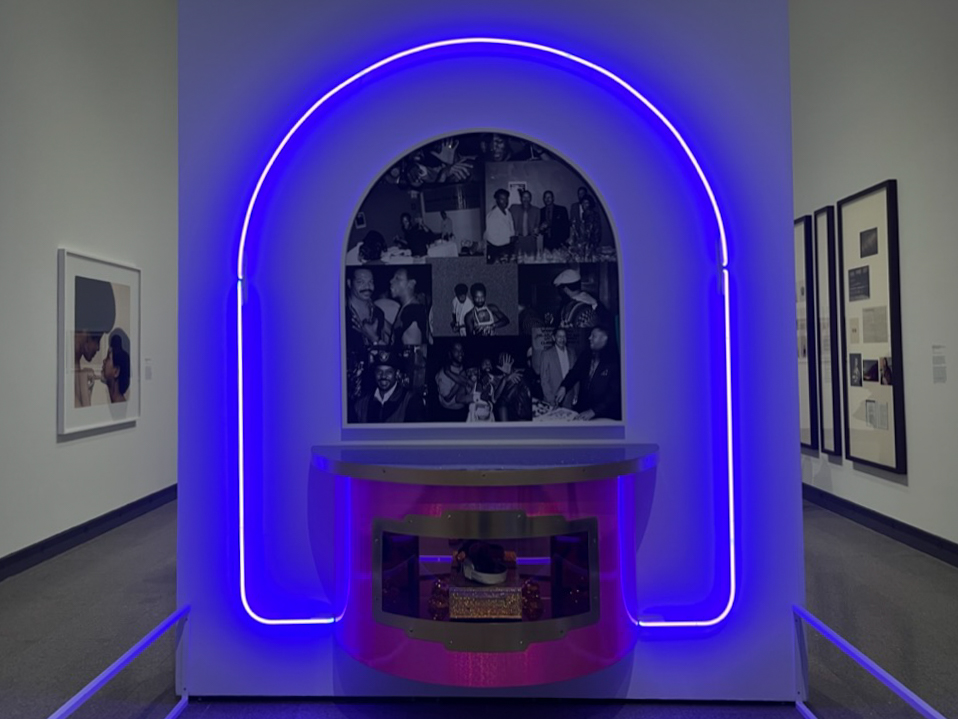Italian visual artist Maurizio Cattelan’s photograph “Don’t Forget to Call Your Mother” depicts an ill-lit bar that displays a red neon sign reading the photo’s title. There’s a clock to the side, striking the final call, begging visitors to befriend feelings of nostalgia. It calls them back to the desire for a deeper connection with the ones they love. The Metropolitan Museum of Art’s current exhibition, “Don’t Forget to Call Your Mother,” centers Cattelan’s piece of the same name and includes multimedia art pieces from The Met’s collection spanning the last 50 years.
Featuring artists such as Sadie Barnette, Darrel Ellis and Hai Bo, the gallery is an intimate collage, reminiscent of an old photo album. “Don’t Forget to Call Your Mother” navigates themes of romanticized recollections of the past, intergenerational relationships and the intersection of personal and political events. The exhibit is thematically and physically divided into two halves, with the first focusing on interpersonal reflections of familial relationships, and the second highlighting how an understanding of society can be rooted in trauma.
Upon entering the first half, visitors are greeted with Larry Sultan’s “Untitled” film stills. Scattered on the wall are photographs of single frames that his parents shot during a family vacation. These photos, seen through the eyes of a child, visualize idealized domesticity. There are intense close-ups of adults, displaying the complicated nature of familial relationships. In one of his 1989 film stills, Sultan captures the spirit of an older woman, her face partially obscured yet cheekily winking at the camera, with a grainy backdrop of water fading into mountains — a dreamlike yet impersonal look into a family vacation. The images portray a romanticized past through the eyes of nostalgia. They reveal Sultan’s confusion as he tried to conceptualize the past with the present, creating a captivating portrayal of romanticized American suburbia.
The rest of the first half of “Don’t Forget to Call Your Mother” gives much-needed insight into traditional American society, such as “The Mom Tapes” by Ilene Segalove. Recorded between 1974-78 during the second-wave feminism movement, Segalove includes television commercials and magazine advertisements to highlight the female stereotypes perpetuated by the media. Segalove then includes herself as a subject to address the tension between a woman’s desire for autonomy and preconceived notions about motherhood and womanhood.
In a droll yet endearing film taped in her mom’s Beverly Hills home, Segalove captures her mother with empathy as she grapples with a difficult realization: Her mom is emblematic of a fading era where the feminine role was solely in the domestic sphere. In videos of her mom walking around the house completing domestic tasks, Segalove honestly and compassionately reflects on her childhood and recognizes her mother’s humanity, but does not let the peculiarity of mundane actions go ignored.
Working as a natural transition piece between the nostalgic and political sections of the exhibit is Darrel Ellis’s “Untitled (Friends).” Ellis began his career in photography as a way to connect to his father Thomas, a portrait photographer killed in an act of police brutality. Years after his father’s death, Ellis found a collection of his archives dating back to the 1950s. Ellis used these captured moments as a way to understand his father and explore a childhood he never experienced. In the exhibit, a photograph of Ellis’s father with friends is paired with Ellis’ recreation with graphite and watercolor, a parallel that displays inherited trauma and created memories.
The theme of politicization and traumatic relationships within the family is carried over to the second half of the exhibition. Two photos from Hai Bo’s “They” series were shot between the 1990s and 2000s, where he rephotographs pictures of family and friends from during and after China’s 1966-76 Cultural Revolution.
Bo’s exploration of societal changes is visualized in his “They No. 7, Three Sisters” through two identically posed black-and-white photos. In the first, the women appear stern, but their underlying youth is evident. In the second, only two women remain, and a black shadow replaces the space of the third woman. By juxtaposing the older age of the two remaining women with their youth, the physical traces of time are highlighted. This piece asks viewers to consider the toll that cultural change and time take on individuals and a family.
As I sat in front of the exhibit’s namesake piece, I saw countless visitors pausing to dial their mothers or loved ones, prompted by the poignant reminder: “Don’t forget to call your mother.” This exhibition challenges viewers to reflect on their familial bonds and past experiences, making it a participatory experience that encourages deeper engagement with the art.
Contact Marisa Sandoval at [email protected].
























































































































































